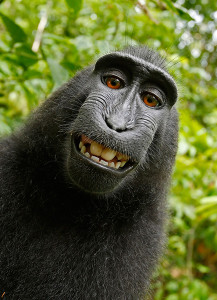 The picture to the left is a “self-portrait” taken by a female Celebes crested macaque in Indonesia. The macaque, who is named “Naruto,” picked up the camera of a photographer named David Slater and took the picture of herself with it. Look at her smiling at the camera. What a character.
The picture to the left is a “self-portrait” taken by a female Celebes crested macaque in Indonesia. The macaque, who is named “Naruto,” picked up the camera of a photographer named David Slater and took the picture of herself with it. Look at her smiling at the camera. What a character.
People for the Ethical Treatment of Animals (PETA) took it upon themselves to file the picture for copyright protection under the name of the macaque, imagining that the proceeds from licensing the picture could be used to help support her habitat. The photographer has asserted that the picture is his, even though he didn’t take it or commission it as a work-for-hire.
The law, most interestingly, excludes the work of selected entities from copyright protection. Under the practices of the Copyright Office, paragraph 313.2 entitled “Works That Lack Human Authorship,” the Office indicates that only works of human authorship are subject to copyright protection. It says, “The Office will not register works produced by nature, animals, or plants.” As examples of what they will not register they list “A photograph taken by a monkey,” or “a mural painted by an elephant.”
It is amazing the personal agency that the Naruto evidenced in her picture, and with so much intentionality behind it, one marvels that it wouldn’t be protected from the moment it was set in its medium? It wasn’t an accidental photograph. Naruto didn’t just accidently push the shutter button of a camera that happened to be pointing at her. She aimed the camera, put on her best face, smiled at the camera and took an endearing photograph of herself. What a sense of selfhood, but apparently selfhood alone is not enough for copyright law.
The PETA attorney for Naruto, Mr. David A. Schwarz, suggested that a ruling in favor of the macaque would be a progressive step forward, not unlike women’s rights, or the Emancipation Proclamation of 1863 that released the slaves from bondage in the 19th century. He argued, that the inability of Naruto to receive a copyright for her work is similar to the inability of African American slaves to own a patent until the 14 Amendment to the U.S. Constitution had been passed.
An article in Motherboard on the subject, quotes PETA’s General Counsel, Mr. Jeffrey Kerr, as holding out hope for the future when he spoke words to the effect that it is common in social cause cases to “lose, and lose, and lose, and then win,” suggesting that one day they will win animal rights protection, and that bringing the action was a step forward for animals rights, win or lose.
Copyright © 2016 • KLM, Inc. • All Rights Reserved





